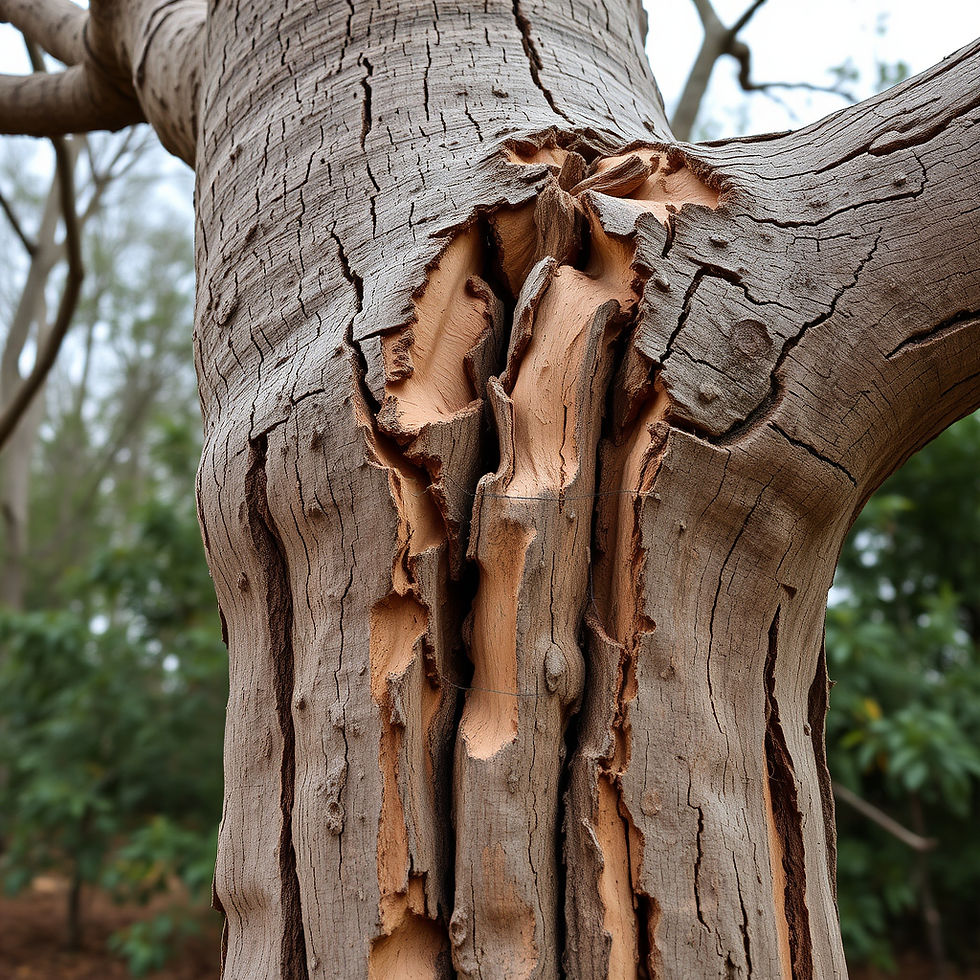5 Warning Signs Your Tree May Be Unsafe
- Sapling
- Aug 26, 2025
- 4 min read
Updated: Aug 28, 2025

Healthy trees bring shade, beauty, and value to your property — but when a tree becomes unsafe, it can quickly turn from an asset into a liability. In the Houston area, where storms, hurricanes, and extreme heat are common, knowing how to spot the early warning signs of a hazardous tree can save you thousands in property damage and prevent serious safety risks.
As ISA-certified arborists, our team at Sap Arborcare & Landscaping has seen firsthand how often homeowners overlook subtle tree issues until it’s too late. Below are five warning signs your tree may be unsafe — and what you can do about it.
1. Cracks or Splits in the Trunk

One of the clearest indicators of a structurally unsound tree is a visible crack or split in the trunk. While minor surface cracks can sometimes be harmless, deep splits can compromise the entire stability of the tree.
In Houston, where our clay soils expand and contract dramatically with moisture changes, these cracks often worsen quickly. If you notice a vertical split, a hollow trunk, or bark peeling away, it’s time to call in a professional Houston tree service for an inspection.
What to do: Don’t ignore cracks. An experienced arborist can assess whether cabling, bracing, or removal is the safest solution.
2. Dead or Hanging Branches
Dead branches are more than unsightly — they’re dangerous. Large dead limbs can fall without warning, especially during one of Houston’s sudden summer storms or high winds.
Signs to watch for include:
Branches with no leaves during the growing season
Brittle, easily snapped twigs
Large limbs hanging loosely in the canopy
What to do: Schedule tree trimming in Houston with a certified crew. Proper pruning not only removes hazards but also promotes healthy regrowth and improves your tree’s overall structure.
3. Root Damage or Soil Uplift
Roots are the anchor of your tree. If they’re compromised, the entire tree can topple. Signs of root damage include:
Soil mounding or uplift on one side of the tree
Visible, decayed, or severed roots
A tree that leans suddenly after a storm
In the greater Houston area, root issues are common after construction projects, driveway expansions, or trenching for utilities.
What to do: If you see soil displacement or suspect root damage, contact a Houston arborist immediately. Root problems are often hidden and require professional diagnosis.
4. Signs of Decay or Disease
Fungal growth, soft wood, and cavities are all indicators of decay. Once decay sets into the heartwood, the tree can lose its structural strength. Common warning signs include:
Mushrooms or conks growing on the trunk or base
Cavities or hollow spots
A musty odor near the base of the tree
Excessive sap leakage
Diseases like oak wilt and bacterial leaf scorch also weaken trees in our region. Early detection and treatment are key to saving your tree and protecting nearby plants.
What to do: Schedule a tree health consultation. At Sap Arborcare, we offer fertilization, disease treatment, and long-term maintenance plans to restore tree vitality when possible.
5. Leaning or Unstable Trees
Not all leaning trees are unsafe — some naturally grow at an angle. But if your tree suddenly starts leaning, or if the soil around the base looks disturbed, that’s a major red flag.
Warning signs of instability include:
A sudden lean after heavy rain or wind
Cracks in the soil around the base
Roots lifting out of the ground
What to do: Don’t wait. A leaning tree can fall at any moment, especially in Houston’s hurricane season. An arborist can determine whether removal is necessary to prevent damage.
Why Unsafe Trees Are a Big Risk in Houston
Houston’s weather makes tree safety a top priority. Between Gulf Coast hurricanes, sudden thunderstorms, and prolonged droughts, unsafe trees pose a unique risk here. A falling tree or limb can:
Damage roofs, fences, and vehicles
Cause injury to family members, pets, or neighbors
Create liability issues for property owners
Proactive tree maintenance in Houston is far less expensive than repairing storm damage.
How Sap Arborcare & Landscaping Can Help
At Sap Arborcare & Landscaping, we’ve built our reputation as trusted tree service experts in Houston by combining knowledge, safety, and care for every property we work on. Our services include:
Tree inspections & hazard assessments
Professional tree trimming & pruning
Emergency storm damage response
Tree removal & stump grinding
Fertilization & disease management
We carry a $2 million insurance policy, and all of our work is backed by over 230 five-star reviews from Houston homeowners and businesses.
Final Thoughts
Your trees are living investments — but when they become unsafe, they can quickly turn into costly liabilities. By watching for these five warning signs, you can act early to protect your property and your loved ones.
If you’re concerned about a tree on your property, don’t wait until after the next storm. Contact the experts at Sap Arborcare & Landscaping, your trusted Houston tree service company, for a professional evaluation today.



























Comments